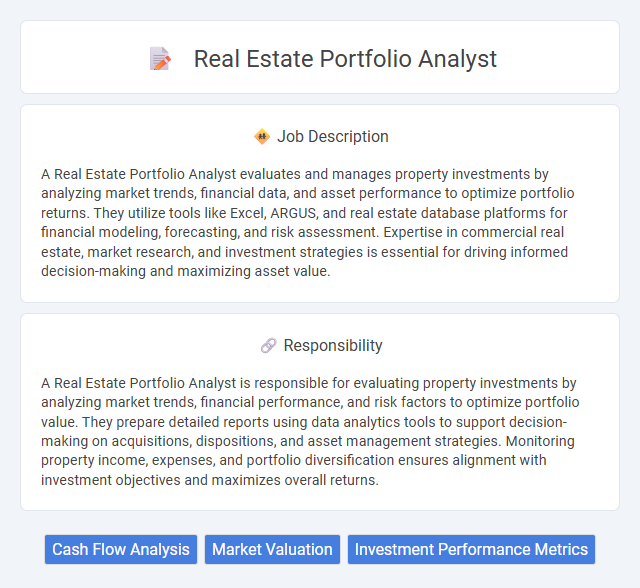
A Real Estate Portfolio Analyst evaluates and manages property investments by analyzing market trends, financial data, and asset performance to optimize portfolio returns. They utilize tools like Excel, ARGUS, and real estate database platforms for financial modeling, forecasting, and risk assessment. Expertise in commercial real estate, market research, and investment strategies is essential for driving informed decision-making and maximizing asset value.
Individuals with strong analytical skills and a keen interest in real estate market trends are likely suitable for a real estate portfolio analyst role. Those comfortable working with large data sets and performing risk assessments may find this job aligns well with their capabilities. People who prefer dynamic, detail-oriented work environments could probably thrive in this position.
Qualification
A Real Estate Portfolio Analyst must possess a strong background in finance, economics, or real estate, often holding a bachelor's or master's degree in these fields. Proficiency in financial modeling, data analysis software such as Excel and Argus, and understanding of market trends are essential qualifications. Experience with portfolio management, investment strategies, and risk assessment further enhances the analyst's capability to optimize real estate asset performance.
Responsibility
A Real Estate Portfolio Analyst is responsible for evaluating property investments by analyzing market trends, financial performance, and risk factors to optimize portfolio value. They prepare detailed reports using data analytics tools to support decision-making on acquisitions, dispositions, and asset management strategies. Monitoring property income, expenses, and portfolio diversification ensures alignment with investment objectives and maximizes overall returns.
Benefit
A real estate portfolio analyst likely enhances investment decision-making by providing data-driven insights that optimize asset performance and mitigate risks. Their analyses probably contribute to improved financial returns and more efficient capital allocation within a property portfolio. Employing such expertise may lead to a stronger competitive advantage in dynamic real estate markets.
Challenge
A Real Estate Portfolio Analyst likely faces the challenge of interpreting vast amounts of market data to forecast property performance accurately. The role probably demands balancing risk and return while adapting to fluctuating economic conditions and regulatory changes. Managing these variables effectively may require advanced analytical skills and strategic decision-making under uncertainty.
Career Advancement
A Real Estate Portfolio Analyst plays a crucial role in evaluating property investments and optimizing portfolio performance, utilizing data analytics and market research. Mastery in financial modeling, risk assessment, and portfolio diversification leads to opportunities for promotion into senior analyst or portfolio manager roles. Continuous skill enhancement in real estate market trends and advanced analytics software accelerates career growth within asset management firms and real estate investment trusts (REITs).
Key Terms
Cash Flow Analysis
Real estate portfolio analysts specialize in cash flow analysis to evaluate the financial performance of multiple properties within a portfolio. They use detailed financial modeling and forecasting techniques to assess rental income, operating expenses, and net cash flow, enabling informed investment decisions. Accurate cash flow analysis helps optimize asset allocation, maximize returns, and identify potential risks in real estate investments.
Market Valuation
A Real Estate Portfolio Analyst specializing in Market Valuation conducts in-depth analyses of property values by examining market trends, comparable sales, and economic indicators to assess investment potential. Utilizing advanced valuation models and data analytics, they provide actionable insights that support strategic decision-making and optimize portfolio performance. Accurate market valuation ensures effective risk management and maximizes returns across diverse real estate assets.
Investment Performance Metrics
A Real Estate Portfolio Analyst specializes in evaluating investment performance metrics such as Internal Rate of Return (IRR), Net Present Value (NPV), and cash-on-cash return to optimize portfolio profitability. They analyze market trends, rental income, occupancy rates, and property appreciation to provide actionable insights for strategic decision-making. Proficiency in financial modeling and data analytics tools is essential to monitor risks and maximize asset value within diverse real estate portfolios.
 kuljobs.com
kuljobs.com